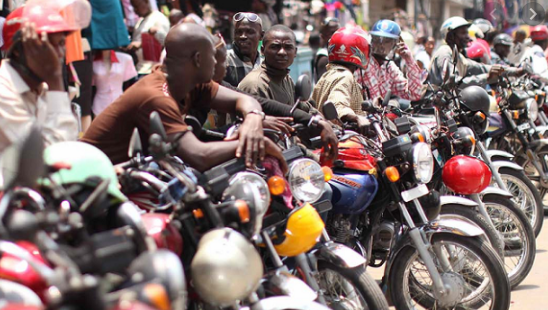In our part of the world, job creation poses a great challenge to nation building. It exposes our vulnerability as a country. Many people especially the youth have resulted to crime and many other undignifying means of livelihood.
Over the past decade, we have experienced a sharp growth in the non-conventional means of public transport by way of motorcycles. Admittedly, it offers extreme advantage of maneuverability, convenience, travelling on poor and bad roads as compared to vehicular movement.
It is dehumanizing to see men, mostly in positions of trust taking advantage of unsuspecting female job seekers. In many occasions, they have succumbed to these pressures just to secure jobs. Some have been left with no option than to resort to prostitution and other deviant behaviours.
This paratransit move is a supplement to the main stream transport business we know and are familiar with. It has created a business venture for entrepreneurs and the job seeking youth who have responded by developing solutions which addresses daily travels needs.
Commuters now have little or no option than to patronize these commercial motorcycles to travel short distances and in a few instances cover comparatively long distances. The unfortunate aspect of the whole situation is that; it is somehow considered as luxury because of the high cost of using them compared with the cost of public transport (trotro) or taxi/uber.
The use of motorbike has grown and attracted momentum over the years. There is a huge market for it, especially in densely populated communities. It eases the gridlock whiles it creates decent jobs for a lot of the youth. People live meaningful lives out of that business and have raised families out of it.
The use of motorcycle for commercial purpose has become a major source of livelihood for many people, many youth; illiterates, school drops and in some instances diploma/degree holders all find themselves in this trade. It offers meaningful jobs for people who would have gone into indecent jobs or resort to crime.
The danger here is that, this youth will one day pick up arms and attack those of us who have the opportunity to make life a little decent for them. They will come to our homes and offices to rob us. In recent times colleagues and friends have shared horrible experiences of attacks from robber’s whiles driving in traffic. We do not need to wait for this development to blow up in our faces because we may not be able to handle the effects.
With the high unemployment rate, we are all faced with the challenge of the SDGs. In our case as Ghanaians, the most pressing needs are; SDG1 (No Poverty), SDG2 (Zero Hunger), SDG3 (Good Health and Well-Being), SDG4 (Quality Education), SDG8 (Decent Work and Economic Growth).
Successive governments may have attempted to create jobs but obviously that has not been enough. The private sector has played a significant role in job creation, however, there is a huge deficit. The informal sector presents a massive potential to accommodate a lot of skilled and unskilled labour.
Countries like, India, China, Indonesia, Vietnam, Netherland, Thailand, Nigeria, Rwanda, Uganda, Togo etc, have motorbikes operating as commercial businesses. The issue is not about just the person sitting on the bike. Unfortunately, that is what we have reduced the debate to. We need to model best practices on how these countries have managed that sector in their respective jurisdictions.
There is an old saying that “necessity is the mother of invention” okada has come to stay and we either embrace it or be swallowed by its effect. This is due to our inability to plan and project our transport needs.
Notwithstanding the justification for the use, the rapid growth in commercial motorcycle service has led to an increase in road accidents, traffic management problems, pervasive noise and increases in local air pollution and greenhouse gas emissions. Sadly, some lives have been maimed or lost due to the use of motorcycles. Our hospitals have some staggering statistics on this worrying development.
It comes with these challenges and maybe more but there are risks associated with every business. This brings into focus the need for regulation for operators in this space of our economy. The riders must be instructed on the use of protective personal equipment for their own safety, their customers and also for easy identification. If they know that they are regulated, the rush to jump traffic will be minimized, they jump traffic lights instructions mostly to avoid police arrest and harassment.
There is the urgent need to impose restrictions on the number of people allowed to ride on a bike. Sometimes we see about four (4) or five (5) people on a single bike and it exposes them to high risk. It becomes difficult for the rider to avoid any collision because of the discomfort and lack of concentration.
Indeed, overloading and such recklessness poses a great danger not only for the rider but those behind him, pedestrian’s, other road users and property. Again the use of helmets must be made compulsory, this will reduce the number of accidents and deaths associated with the use of motorbikes.
The regulation should strongly consider age limit for riders, this is because we see minors use okada. Kids should be banned from sitting on motorbikes since they are at great danger compared to adults. The industry requires intensive training centres or schools where licences will be given to riders after a successful completion of their training.
Any form of regulation must not be limited to only motorcycles, there are many tricycles we see every day, either selling sachet water, carrying farm produce, waste, passengers etc. The regulation must cover them so we do not revisit the issue of tricycles years to come.
It is for these reasons that a law and a progressive policy framework is needed to manage its operation. We have seen commercial vehicles kill 60 passengers at a go. Trotro drivers are sometimes as reckless as the okada rider if not worse. Even private car owners have been irresponsible in many, its human nature.
Surprisingly, commercial vehicle operation is a well regulated industry with the needed support, training and logistics from all stakeholders. They apply sanctions to their members when the misbehave yet we encounter some very unruly drivers and drivers mate on daily basis.

Again regularizing the use of motorbikes for commercial use will reduce crime to a large extent. This is because the various Metropolitan, Municipal and District Assemblies (MMDAs) will be required to issue embossment stickers just as its done for the taxi business.
The MMDAs will make revenue out of this business as they are continuously encouraged to increase their revenue generation in their respective jurisdictions. Such revenues can go into developing the locality and ease the burden on central government.
Commercial motorcycle business (okada) can accommodate over 1million direct and indirect jobs, let’s consider the below;
- Registered Training schools (Like car driving schools)
- Registered Associations like GPRTU, PROTOA etc.
- Registered Mechanic shops (Example VIP service centers)
- Accra Technical Training Centre-(ATTC), Accra Technical University/ Kumasi Technical University and other technical schools can offer specific programmes to train (engineers) who can be employed to service and maintain these bikes and even develop design and build their own bikes
- Assembly Plants and warehouses
- Importation of Parts (pay import duty)
- Okada Stations (they will employ station masters, food vendors etc.
- Graduates like accountants, caterers etc can be employed in some of these above listed establishments
- Boost tourism – some countries use bikes for tourist visitations (bikes can go to where cars cannot go and again offer a panoramic view on nature)
An okada rider makes an average of ghc1000 a month, indeed much more than a security officer and many more graduate at entry level employment. We cannot discount the positive effects of their operations since it offers them an opportunity to make ends meet.
The usage of okada for farming in the villages cannot be downplayed. It has been extremely helpful to farmers and village folks. These are farmers who would have ordinarily walked a number of kilometers to farm and cover same distance back home. In a very exciting manner, their farming equipment’s, seedlings, fertilizers etc are conveyed to their farms, these are things they would have carried on their heads whiles walking to their farms.
In healthcare delivery, okada riders have carried many sick people and women in labour to health facilities, shockingly, they may have died if not for the timely intervention of okada. Some healthcare professional use motorbikes to work every day considering the distance they would have had to cover by foot.
If you have ever been held up in traffic jam under the hot weather, you will appreciate the need for the use of okada as the best and most convenient means of transport. I am certain that most of us have benefitted either directly or indirectly from a near miss because of the intervention and swiftness of okada riders.
Ironically, politicians buy motorbikes for their party members and loyalist for campaign, what do they expect them to do with these bikes after campaign when they don’t provide them with job?
Let’s strengthen stakeholder consultations and take the bold decision to legislate a law to regulate and streamline the activities of okada. Indeed, OKADA has come to stay, we need to embark on a campaign that will promote and create awareness on “Ride safe so you can ride again”.










